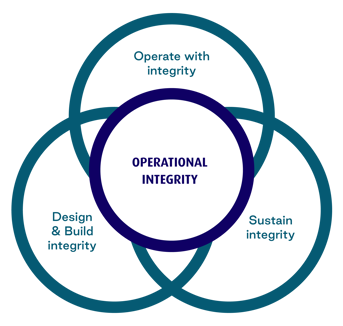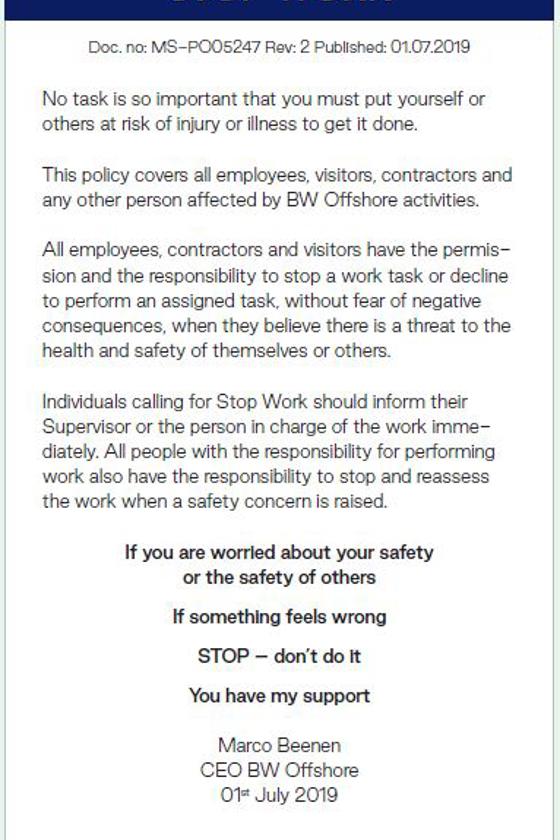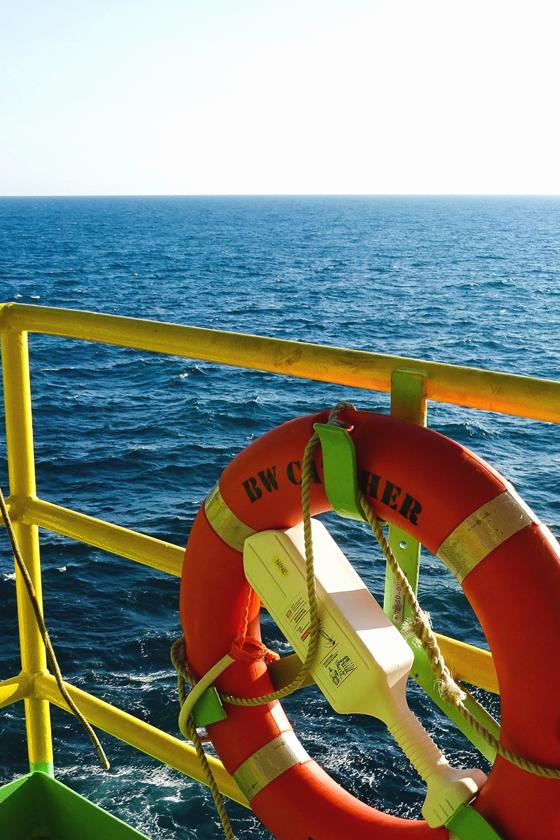Operational Integrity
Operational Integrity defines the relevant performance requirements and targets. It also provides an assurance framework to demonstrate OI performance throughout the lifecycle, from design and construction to installation and operations.
The Operational Integrity function also manages Health, Safety, Security, Environmental, Quality (HSSEQ) protocols that enable BW Offshore to meet and exceed mandatory requirements and those we have chosen to apply as best practice.
BW Offshore applies best-in-class as a benchmark for monitoring, assurance and improvement of operational performance and compliance.


This framework is defined within the BW Offshore Management System, with the desired outcome of efficient, reliable and compliant operations delivered with zero harm through a comprehensive assurance programme. This assurance programme then allows for opportunities for improvement to be identified and realised.
Operational Integrity Compliance
In 2021, BW Offshore migrated its certification status to ISO 45001 Occupational Health and Safety Management Standard. This enhances the BW Offshore Management System by ensuring opportunities for improvement are included in third-party verification of the occupational health and safety management system. BW Offshore continues to be certified to ISO 14001:2015 requirements for Environmental Management.
All BW Offshore’s FPSOs are certified in accordance with the requirements of the International Ship and Port Facility Security (ISPS) Code.
Continuous Improvement
BW Offshore’s actions for continuous improvement involves:
- Regularly monitoring leading and lagging health and safety indicators
- Periodic review of risk assessments and control measures
- Conducting incident investigations to identify improvement actions
- Circulating safety alerts to the wider organisation
- Implementing health and safety initiatives
- Audits, verification and inspections
- Facilitating Senior Management oversight

Stop Work
BW Offshore has a target of being an industry leader, with the lowest reasonably practicable frequencies for lost time injuries, high-risk incidents - including spills to the environment and unplanned emissions - and occupational illnesses. BW Offshore believes that striving to be an industry leader in safety is aligned with the firm commitment of ‘zero harm’.
We foster a strong culture through the corporate values “We LEAD with Integrity”, record all incidents and apply a ‘learning from failures’ approach to continuous improvement at all levels in the organisation.
Our OI function continuously monitors trends and takes prompt action to prevent or reverse any unwanted developments. We give all employees the explicit authority to stop all actions that they think are unsafe and/or are unsure of, and to initiate a process to define and clarify without any repercussions or questions.
Emergency Preparedness
The standards define requirements for Emergency Response, Emergency Support and Crisis Management for operational assets, project worksites, permanent office locations and the corporate organisation. Each offshore asset has a specific Emergency Response Plan covering the Major Accident Hazards present onboard.
Emergency Response and Crisis Management Plans are aligned with industry recognised Incident Management System (IMS) principles, including the incident planning cycle and risk-based prioritisation concepts. The Emergency Preparedness material is available to all personnel in the BW Offshore Management System and on our intranet.
The procedures ensure timely and effective action is taken to protect people, the environment, assets and company reputation in the event of an emergency.
Regular training in the form of emergency exercises and drills are conducted to ensure personnel maintains a high level of readiness. Every asset is required to carry out regular, realistic drills to test aspects of their Emergency Response Plan. Lessons learned are shared onboard during post-drill debriefs and with onshore teams. Drills reports are sent to OI management for review and analysis. In addition, full tier exercises are performed across all operations on an annual basis to ensure that all aspects of Emergency Preparedness are effective and continuously improved.
